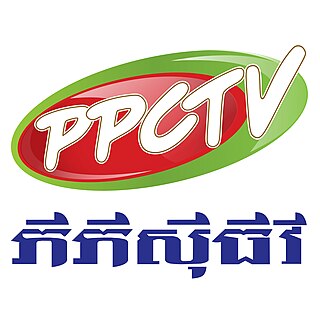Related Research Articles

Wireless broadband is a telecommunications technology that provides high-speed wireless Internet access or computer networking access over a wide area. The term encompasses both fixed and mobile broadband.

Telecommunications in Cambodia include telephone, radio, television, and Internet services, which are regulated by the Ministry of Posts and Telecommunications. Transport and posts were restored throughout most of the country in the early 1980s during the People's Republic of Kampuchea regime after being disrupted under Democratic Kampuchea.
Voice over Internet Protocol (VoIP), also called IP telephony, is a method and group of technologies for voice calls for the delivery of voice communication sessions over Internet Protocol (IP) networks, such as the Internet.

An Internet service provider (ISP) is an organization that provides myriad services related to accessing, using, managing, or participating in the Internet. ISPs can be organized in various forms, such as commercial, community-owned, non-profit, or otherwise privately owned.

A web hosting service is a type of Internet hosting service that hosts websites for clients, i.e. it offers the facilities required for them to create and maintain a site and makes it accessible on the World Wide Web. Companies providing web hosting services are sometimes called web hosts.
An online service provider (OSP) can, for example, be an Internet service provider, an email provider, a news provider (press), an entertainment provider, a search engine, an e-commerce site, an online banking site, a health site, an official government site, social media, a wiki, or a Usenet newsgroup.

A hotspot is a physical location where people can obtain Internet access, typically using Wi-Fi technology, via a wireless local-area network (WLAN) using a router connected to an Internet service provider.

Network neutrality, often referred to as net neutrality, is the principle that Internet service providers (ISPs) must treat all Internet communications equally, offering users and online content providers consistent transfer rates regardless of content, website, platform, application, type of equipment, source address, destination address, or method of communication. Net neutrality was advocated for in the 1990s by the presidential administration of Bill Clinton in the United States. Clinton's signing of the Telecommunications Act of 1996, an amendment to the Communications Act of 1934, set a worldwide example for net neutrality laws and the regulation of ISPs.
A service provider (SP) is an organization that provides services, such as consulting, legal, real estate, communications, storage, and processing services, to other organizations. Although a service provider can be a sub-unit of the organization that it serves, it is usually a third-party or outsourced supplier. Examples include telecommunications service providers (TSPs), application service providers (ASPs), storage service providers (SSPs), and internet service providers (ISPs). A more traditional term is service bureau.
An Internet hosting service is a service that runs servers connected to the Internet, allowing organizations and individuals to serve content or host services connected to the Internet.

The National Museum of Cambodia is Cambodia's largest museum of cultural history and is the country's leading historical and archaeological museum. It is located in Chey Chumneas, Phnom Penh.
[[File:|thumb||alt=]] A sampot, The national costume of Cambodia is the sampot, or Cambodian sarong. It is handwoven and comes in both loose and fitted styles and is worn over a shirt at the waist. The fabric used is usually silk, cotton, or a combination of both. The sampot for women is similar to the sarongs of Laos and Thailand. There are many different styles of sampot.The national costume of Cambodia is the sampot, or Cambodian sarong. It is handwoven and comes in both loose and fitted styles and is worn over a shirt at the waist. The fabric used is usually silk, cotton, or a combination of both. The sampot for women is similar to the sarongs of Laos and Thailand. There are many different styles of sampot. pha nung.

The Internet in the United States grew out of the ARPANET, a network sponsored by the Advanced Research Projects Agency of the U.S. Department of Defense during the 1960s. The Internet in the United States of America in turn provided the foundation for the worldwide Internet of today.
Telecom Cambodia (TC) is a state corporation of Cambodia, and is the principal telecom company of that country. The company was launched in 2006 as part of the Royal Government's Second Mandate, by the Ministry of Posts and Telecommunications, which until then had operated the country's telecom network itself. The head offices of the company are located in Phnom Penh. TC provides service to every province of Cambodia.
The Ministry of Posts and Telecommunications is the government ministry that governs the postal system and the telecommunications systems of Cambodia. The ministry maintains offices in Phnom Penh.

PPCTV Co., LTD , also known as PPCTV, is a cable TV subscription service established by Phnom Penh Municipal Cable Television (PPCTV). It is one of the major cable TV services in Cambodia with the largest number of viewers concentrated in Phnom Penh.

The Royal Group, based in Phnom Penh, is Cambodia's largest diversified conglomerate and holding company with investments in various industries in the country including telecommunication, media, banking, insurance, resorts, education, property, trading and agriculture.
Agence Kampuchea Press is the national news agency of Cambodia.
Cambodian Singmeng Telemedia co., Ltd is a Cambodian provider of digital terrestrial television (DTT) and over-the-top content television.